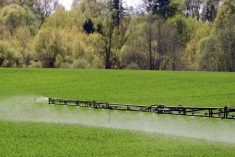WINNIPEG, Sept. 7 (CNS) – Diesel prices in Western Canada have risen by about six to seven cents a litre since Hurricane Harvey hit the Texas coast, causing many refineries to temporarily close.
An analyst of the fuel industry says harvest pressure will likely keep the diesel market from correcting downward, and push prices up a bit more.
“So it (the market) appears to be leveling off from the Harvey hit but harvest is a factor on (future) price hikes,” said Dan McTeague of Gasbuddy.com.
The impact on gasoline has been more pronounced than diesel but the two are linked. McTeague says for every cent diesel went up, gasoline went up two cents.
Read Also

Alberta crop conditions improve: report
Varied precipitation and warm temperatures were generally beneficial for crop development across Alberta during the week ended July 8, according to the latest provincial crop report released July 11.
“A week or two from now it could be more,” he said, in reference to the on-going harvest.
Prices for diesel in Western Canada mostly ranged from 95 to 99 cents a litre, according to Gasbuddy.com.
Diesel traditionally goes up in the fall meaning some of the bump will likely be factored into the market.
The approach of another storm has also sparked concerns it could impact the energy sector. Hurricane Irma has been chewing up islands in the North Atlantic this week and is expected to strike the southeast portion of the United States by Sunday. The storm features sustained winds of 185 miles per hour and has already been labelled as the strongest hurricane ever.
“This is going to be a far more-active season for hurricanes, the third most since 1950,” said McTeague.
According to another analyst, the impact from Harvey will continue to be felt for some time.
“You are looking at some upward pressure on prices,” said Tom Kloza of the Oil Price Information Service in Florida. “Prices are as high as they’ve been in 2017 for diesel.”
He adds one thing that will help cushion the blow at the pumps for diesel operators, is the looming start-up of a major refinery in Alberta.
North West Upgrading is expected to begin processing 50,000 barrels of low-sulphur diesel fuel a day by late 2017.
“So we’ll see plenty of new supply coming on stream,” said Kloza.
He adds a deal by the Organization of the Petroleum Exporting Countries (OPEC) is also due to expire on March 31. The agreement saw major oil-producing countries trimming oil production in a bid to improve prices.
However OPEC’s cuts have been offset by rising production by producers outside the cartel
















